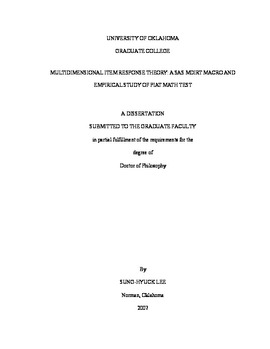| dc.contributor.advisor | Rodgers, Joseph L., | en_US |
| dc.contributor.author | Lee, Sung-hyuck. | en_US |
| dc.date.accessioned | 2013-08-16T12:20:35Z | |
| dc.date.available | 2013-08-16T12:20:35Z | |
| dc.date.issued | 2007 | en_US |
| dc.identifier.uri | https://hdl.handle.net/11244/1156 | |
| dc.description.abstract | Even though unidimensional item response theory (IRT) provides a better framework for practical test settings than classical test theory (CTT), theoretical and empirical evidence shows that most response data violate the assumption of unidimensionality. There are several computer programs dedicated to estimating parameters based on the multidimensional perspective (MIRT). However, their accessibility is still costly, and they are not easy to use. In this paper, we present a SAS macro called MDIRT-FIT, to increase accessibility to the benefits obtained from this recent measurement theory development. The program is developed to estimate parameters based on a compensatory multidimensional item response theory (MIRT) model for dichotomous data. The full information item factor analysis model with an EM algorithm suggested in Bock & Aitken (1988) is implemented in the SAS programs. The estimation program written in SAS/IMLRTM provides both parameters of MIRT and parameters of the factor analysis model with their associated standard errors and overall model fit statistics. The maximum number of latent traits that can be estimated with this program is limited to five latent dimensions because of both computational burden and practical sufficiency. The accuracy and stability of the SAS macro is examined by utilizing simulated data of examinees' responses. The PIAT math test, a subset of the Peabody Individual Achievement Test, was examined to validate the comparability of the SAS macro to TESTFACT which is widely used for estimating parameters of MIRT models. | en_US |
| dc.format.extent | xii, 80 leaves : | en_US |
| dc.subject | Examinations. | en_US |
| dc.subject | Item response theory. | en_US |
| dc.subject | Psychology, Psychometrics. | en_US |
| dc.title | Multidimensional item response theory: A SAS MDIRT macro and empirical study of PIAT math test. | en_US |
| dc.type | Thesis | en_US |
| dc.thesis.degree | Ph.D. | en_US |
| dc.thesis.degreeDiscipline | Department of Psychology | en_US |
| dc.note | Adviser: Joseph L. Rodgers. | en_US |
| dc.note | Source: Dissertation Abstracts International, Volume: 68-02, Section: B, page: 1357. | en_US |
| ou.identifier | (UMI)AAI3255213 | en_US |
| ou.group | College of Arts and Sciences::Department of Psychology | |
